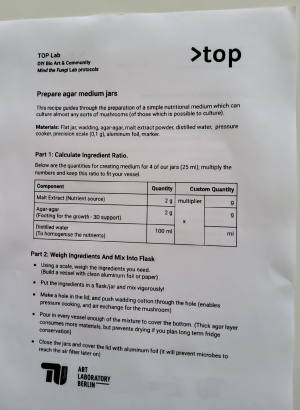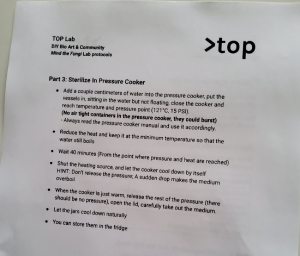| Line 86: | Line 86: | ||
-> Carpenter | -> Carpenter | ||
3. Knowledge | 3. Knowledge | ||
Books: | |||
Mycelium running: how mushrooms can help save the world (2004) | |||
Organic mushroom farming and mycoremediation (2014) | |||
Radical Mycology: A Treatise on Seeing & working with Fungi (2016) | |||
The fifth kingdom; An introduction to mycology Bryce Kendrick (2017) | |||
Academical knowledge | |||
first -> wikipedia and sources (gives good overview; sources; scientific papers) | |||
second -> academic papers (google schola; unpaywall.org; if behind paywall: ask for copy; wikipedia.org/Sci-Hub: grey area of copy right) | |||
"if you have a big goal break it up into small goals you can achieve" | |||
== Ethics and values in the lab == | |||
-> respect for our creatures | |||
-> respect for lab partners | |||
-> don't take criticism personally | |||
-> only go to the lab when you are healthy and in the right mood (concentrated; healthy; good mindful mindstate) | |||
-> respect time and projects of others (name everything; report when things run out or get broken) | |||
How to respect our creatures and each other: | |||
-> what is the specimen? (mushroom parts still thrive even if you take parts of it for example) | |||
-> destroy things that aren't from here | |||
-> nothing leaves the lab alive unless it comes from the natural habitat outside | |||
-> we work to help understand more for everyone (goal: sustainability) | |||
-> respect experts from other fields (everybody can provide value) | |||
-> be inclusive; everybody is equal | |||
== 05.11.22 == | |||
== Chosen Organism: Euglena == | == Chosen Organism: Euglena == | ||
Revision as of 15:58, 27 January 2023
Documenation of the main Workshop 04.11.22
Plan for today (04.11) and tomorrow (05.11): -> cultivate first organism (mushroom) -> lab safety (how to work safely in the lab) -> getting to know the lab equipment -> Redesign the lab experience for our own home (How to make our own Diy-Biolab) -> lab ethics and values
Materials and manual for growing first organisms:
Different organisms need different things to grow
examples: -> Algae can photosynthesize; they need light and salt -> slime mold (unicellar organisms that expand in search of food; they're neither fungi nor mushrooms) -> bacteria
- We had a break from 11:45 am to 01:30 pm -
Building a Diy-Lab at home
Resources :
Equipment:
local shopping
-> hardware store (tables with a glass or ceramic top)
-> bricolage market
-> artists shop
-> pharmacies
online shopping
-> amazon; new equipment
-> Ebay; used equipment
-> Aliexpress; quick and cheap
consumables (cottonswabs/gloves etc.)
-> amazon; for small fast delivery
-> aliexpress; for cheap batch delivery
-> alibaba
-> specialised onlineshops; more or less specialised producers and retailers
chemicals
-> Buying at local stores (check cross-application; check purity grade according to use)
-> online shopping (check if law allows private purchase)
-> maybe extract your chemicals from mixtures (know what you are doing and with whom)
Growing our own mushrooms
For the Mycofabrication session we used Reishi (Ganoderma Lucidum)
what do we need?
1. Mushroom/spores where can you find it:
online shops -> Pilzmännchen.de -> MycoGenetics the forest: -> on the ground -> on dead logs or living trees
2. Substrates (mushroom food):
buy at local stores or online -> Bricolage market (saw dust) -> Pet shop -> Carpenter
3. Knowledge
Books:
Mycelium running: how mushrooms can help save the world (2004)
Organic mushroom farming and mycoremediation (2014)
Radical Mycology: A Treatise on Seeing & working with Fungi (2016)
The fifth kingdom; An introduction to mycology Bryce Kendrick (2017)
Academical knowledge
first -> wikipedia and sources (gives good overview; sources; scientific papers)
second -> academic papers (google schola; unpaywall.org; if behind paywall: ask for copy; wikipedia.org/Sci-Hub: grey area of copy right)
"if you have a big goal break it up into small goals you can achieve"
Ethics and values in the lab
-> respect for our creatures
-> respect for lab partners
-> don't take criticism personally
-> only go to the lab when you are healthy and in the right mood (concentrated; healthy; good mindful mindstate)
-> respect time and projects of others (name everything; report when things run out or get broken)
How to respect our creatures and each other:
-> what is the specimen? (mushroom parts still thrive even if you take parts of it for example)
-> destroy things that aren't from here
-> nothing leaves the lab alive unless it comes from the natural habitat outside
-> we work to help understand more for everyone (goal: sustainability)
-> respect experts from other fields (everybody can provide value)
-> be inclusive; everybody is equal
05.11.22
Chosen Organism: Euglena
To-Do's
- grow Euglena
- care for Euglena
- work out a creative Projekt using Euglena

